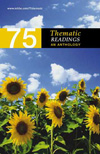
Ellen Goodman |  |
Ellen GoodmanEllen Goodman, "A Reasonable Woman Standard" Ellen Goodman (1941- ) was born in Newton, Massachusetts and earned a
B.A. from Radcliffe College in 1963. She's been a magazine and newspaper
reporter, and has been a syndicated columnist based at the Boston Globe
for more than twenty-five years. In addition Goodman has been a radio
and television commentator and has taught journalism at Stanford University.
Among her books are the collections of her columns, Close to Home
(1979), Keeping in Touch (1985), and Value Judgments (1993).
She's also co-written a book (with Patricia O'Brien) called I Know
Just What You Mean: The Power of Friendship in Women's Lives (2000).
Her work also appears in periodicals such as The Women's Review of
Books, the Los Angeles Times, and the Washington Post.
Goodman has been a Nieman fellow at Harvard University and won the Pulitzer
Prize for her commentary in 1980. "A Reasonable Woman Standard"
was first published in the Boston Globe in 1991. | QUESTIONS FOR DISCUSSION | CONTENT - How did Bryant Gumbel and Katie Couric differ in their approach to
the question of whether pinups are appropriate in the workplace?
- How did the issue of sexual harassment affect the PBS MacNeil/Lehrer
program?
- According to Goodman, what change among women prompted a new awareness
about sexual harassment?
- In the past, what options did a victim of sexual harassment have?
- What are the rules to determine whether sexual harassment has occurred?
- Explain briefly how men and women, according to Kim Lane Scheppele,
might see sexual harassment differently. How can this difference be
overcome if the matter goes to court?
STRATEGY AND STYLE - Explain why the author calls date rape a "should-be oxymoron."
What does date rape have to do with sexual harassment?
- The paragraphs in this piece are noticeably shorter than those in
most of the others in your text. Discuss how this article's origin as
a newspaper column affected this decision. How would the piece change
if the media context changed? Pick one specific mass medium and explain.
- Discuss how this piece can be classified as a definition essay. Make
sure that you make clear the author's main definition and her types
of support.
- How would you characterize the tone of this piece? Is it chatty,
personal, impersonal, academic, or something else? Make sure you describe
the tone clearly and use evidence from the reading to support your answer.
| ENGAGING THE TEXT | - How do you rank yourself in terms of empathy? Is it easy for you
to "get in another's head," as Goodman puts it, or is it difficult?
How can you relate your feelings about empathy to this reading?
- Imagine that you're a supervisor in an office and you witness an
act of sexual harassment occurring between two people you supervise.
They don't see you, and the offended party doesn't make a complaint.
What would you do and why?
| SUGGESTIONS FOR SUSTAINED WRITING | - Goodman confines her discussion of sexual harassment to the workplace,
but college students have also brought cases against college teachers.
Compare and contrast the issues involved in these two types of harassment.
Are they more similar or more different? What's the difference between
the employee relationships and those found among teachers and students?
- Can men be the victims of sexual harassment? If so, under what circumstances?
If not, why not? What does Goodman have to say about this issue? What
do you have to say?
| FOR FURTHER RESEARCH | Goodman doesn't mention the "Professor" and the "Judge"
in paragraph one by name. Do some research in order to write a report
that answers these questions: Who were they? What was the conflict? How
was it resolved? What are the "Professor" and the "Judge"
doing today? | WEB CONNECTION | Here are some quotations
by Goodman. Did you find any that you could use in your own writing about
this author? | LINKS | Biographical Here's Goodman's profile
from a lecture agency. What's the focus of her biography on this page?
How trustworthy do you feel the information is here? How can you tell? Here's an introduction
to Goodman from the Washington Press Club Foundation. How is the biographical
information different from that presented in the page above? What's
similar? This page
about I Know Just What You Mean offers a brief bio, a photo,
and some related links.
Bibliographical Here's a column
she wrote about coffee. To what drugs does she compare caffeine? What
larger issue does she draw from the discussion? Where do you stand on
this issue? This is a transcript of a Frontlineinterview
of Goodman in which she discusses politics, the state of the media,
and feminism. Would you like to read more from this author? This is an article
in which Goodman reveals the true nature of workplace harassment. Hint:
sexual harassment is not about sex.
Cultural This is the citation
for her Pulitzer Prize. Do you recognize any of the other authors on
the page? How would you go about researching them? Interested in putting this author's work into a political and cultural
context? This is the homepage
of a Women's Movement site from Duke University's website, and it should
be invaluable in getting you started. Here is a review
of her book I Know Just What You Mean. What did you learn about
the book from the review? What kind of information would require consulting
the book itself?
|
|
|
|